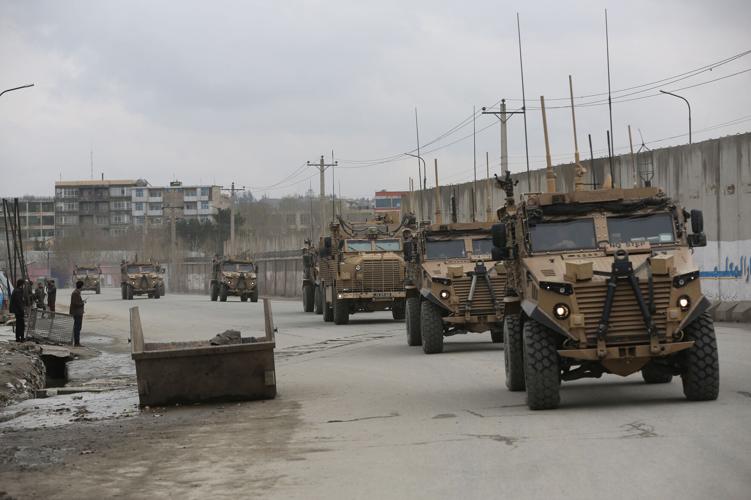LONDON (AP) — British governments past and present face allegations of avoiding scrutiny and undermining democracy after the revelation that thousands of Afghans have been resettled in the U.K under a program that was hidden from the media, the public and lawmakers in Parliament.
Key information was also kept from the Afghans themselves, who had assisted U.K. forces and whose personal details had been disclosed in a huge data leak. Many plan to sue the British government for putting them in danger from the Taliban. Some are left in Afghanistan as the current British government says the resettlement program will end.
Here’s what happened in an extraordinary chain of events.
An email error with huge consequences
The saga was triggered by the chaotic Western exit from Afghanistan in August 2021 as the Taliban, ousted from power 20 years earlier, swept across the country, seized Kabul and reimposed their strict version of Islamic law.
Afghans who had worked with Western forces — as fixers, translators and in other roles — or who had served in the internationally backed Afghan army were at risk of retribution. Britain set up a program, known as the Afghan Relocations and Assistance Policy, or ARAP, to bring some to the U.K.
In February 2022, a defense official emailed a spreadsheet containing the personal information of nearly 19,000 ARAP applicants to someone outside the Ministry of Defense. The government says the individual thought they were sending a list of about 150 names, not the whole set.
The British government only became aware of the leak when a portion of the data was posted on Facebook 18 months later by someone who threatened to publish the whole list.
The government sought secrecy
The leak sparked alarm among British officials who feared as many as 100,000 people were in danger when family numbers of the named individuals were added. The then-Conservative government sought a court order barring publication of the list.
A judge granted a sweeping order known as a super injunction, which barred anyone from revealing not only information about the leak but the existence of the injunction itself.
Super injunctions are relatively rare and their use is controversial. Most of the handful of cases in which they have come to light involved celebrities trying to prevent disclosures about their private lives. This is the first known case of a super injunction being granted to the government.
Former Defense Secretary Ben Wallace said Wednesday that he sought the legal order to gain “time and space to deal with this leak, find out whether the Taliban had it” and protect those at risk.
Wallace said he asked for an ordinary injunction — not a super injunction — for a period of four months. The gag order remained in place for almost two years.
A secret program sparked a legal battle
The government began bringing to Britain the Afghans on the leaked list who were judged to be most at risk. To date, some 4,500 people — 900 applicants and approximately 3,600 family members — have been brought to Britain under the program. About 6,900 people are expected to be relocated by the time it closes, at a cost of 850 million pounds ($1.1 billion).
In all, about 36,000 Afghans have been resettled in the U.K. since 2021.
Meanwhile, several news organizations had learned of the leaked list but were barred from publishing stories about it. They challenged the super injunction in court, and a judge ordered it lifted in May 2024 — but it remained in place after the government appealed.
The government finally came clean
Britain held an election in July 2024 that brought the center-left Labour Party to power. Prime Minister Keir Starmer and his Cabinet learned of the injunction soon after taking office and grappled with how to proceed.
In January, the government ordered a review by a former senior civil servant. They found little evidence that the leaked data would expose Afghans to a greater risk of retribution from the Taliban. The review said the Taliban had other sources of information on those who had worked with the previous Afghan government and international forces and is more concerned with current threats to its authority.
Given those findings, the government dropped its support for the super injunction. The injunction was lifted in court Tuesday, and minutes later Defense Secretary John Healey stood in the House of Commons to make the saga public for the first time.
Many questions remain unanswered
Healey said the secret settlement route was being closed, but acknowledged Wednesday that “the story is just beginning,” and many questions remain unanswered.
Immigration critics including Reform UK leader Nigel Farage are demanding to know what screening was done on the people who came under the secret program.
Lawyers for Afghans on the leaked list want to know why the information was kept from them. Adnan Malik, head of data privacy at U.K. legal firm Barings Law, said he was assembling a class-action lawsuit by hundreds of former translators, soldiers and others.
Lawmakers and free speech advocates say the use of a super injunction is deeply worrying. They ask how Parliament and the media can hold the government to account if there is such stringent secrecy.
Judge Martin Chamberlain, who ruled that the injunction should be lifted, said Tuesday at the High Court that the super injunction “had the effect of completely shutting down the ordinary mechanisms of accountability.”
Healey acknowledged that “you cannot have democracy with super injunctions in place,” and said the government had acted as quickly and safely as it could.
“Accountability starts now,” he told the BBC.







